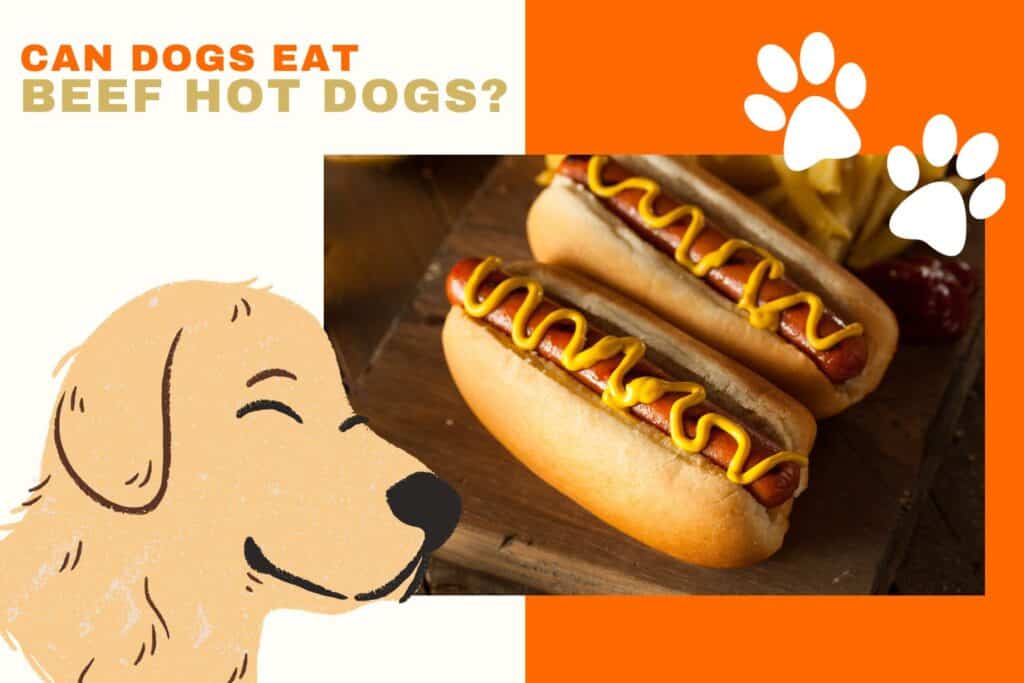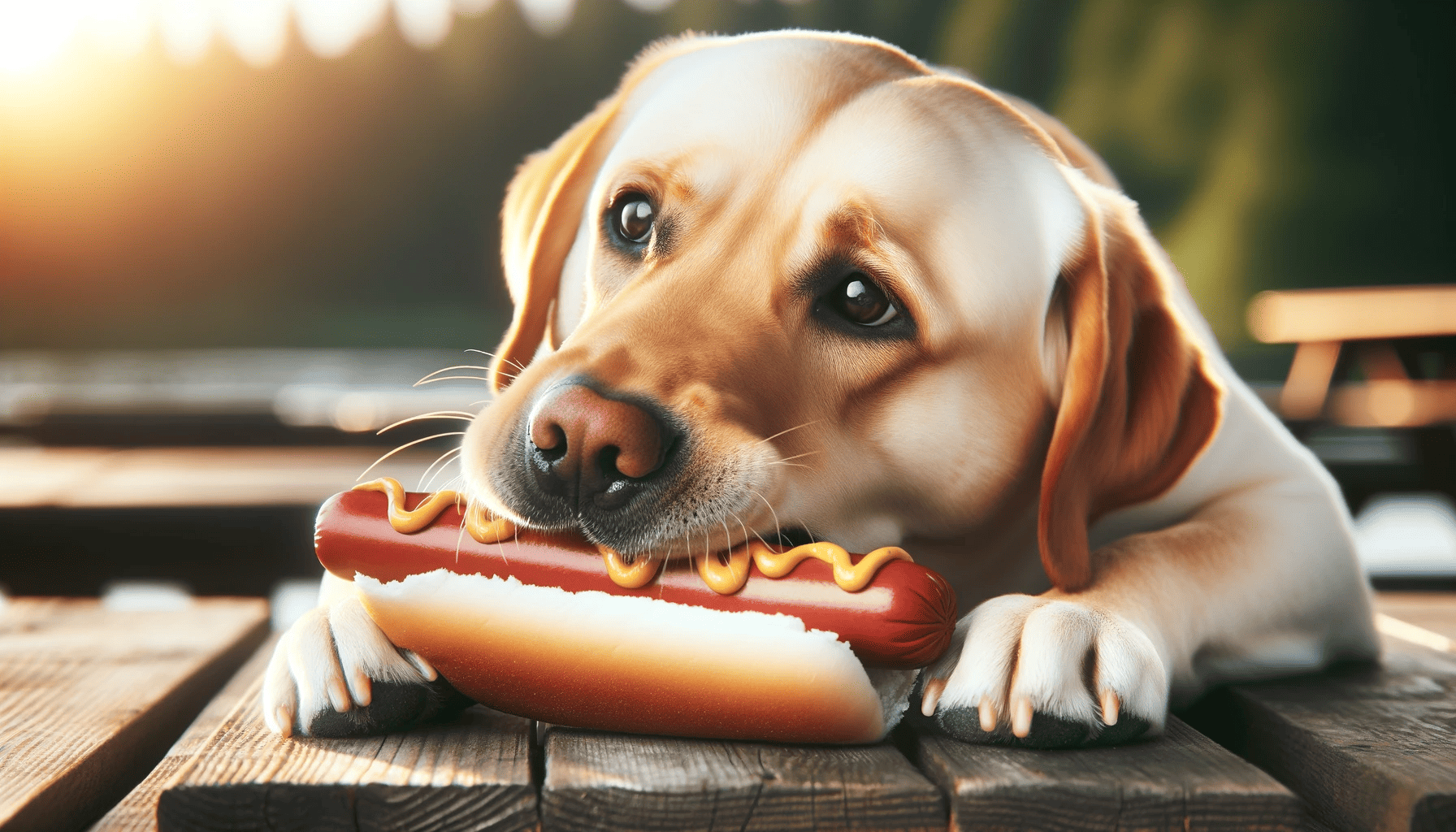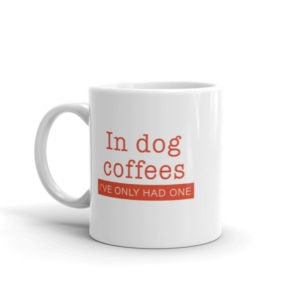This post may contain ads and affiliate links and we may earn a small commission when you click on the links at no additional cost to you. As an Amazon Affiliate, we earn from qualifying purchases. You can read our full disclaimer here.
Can Dogs Eat Beef Hot Dogs? The Inside Scoop for Hounds

Can dogs eat beef hot dogs? It’s a common question that pops up whenever we’re munching on these tasty snacks and our four-legged pals give us those “please share” eyes.
Understanding what our dogs eat is super important. It’s not just about giving them something yummy – it’s about keeping them healthy and happy. While it’s tempting to toss a piece of your hot dog to your eager pup, there’s more to consider here.
Can Dogs Eat Beef Hotdogs? A Look at the Nutritional Contents
Beef hot dogs are a popular snack, but what exactly are they made of? Typically, they contain:
- Beef: The main ingredient, providing protein.
- Water: Often used to help in processing.
- Salt: Adds flavor but also contributes to a high sodium content.
- Preservatives: Such as sodium nitrite, which helps in maintaining color and preventing spoilage.
- Flavorings: These can vary but often include garlic powder, paprika, and other spices.
- Fillers and Binders: Such as corn syrup, dextrose, and dry milk, which contribute to texture and taste.
Check out one of our most popular posts about whether dogs can eat provolone cheese!
Comparison to a Dog’s Dietary Needs

Dogs have specific nutritional requirements that differ from humans. Let’s see how the components of beef hot dogs match up.
| Component in Beef Hot Dogs | Effect on Dogs’ Diet |
|---|---|
| Protein | Beef provides protein, but the quality in hot dogs is lower than in whole meats. |
| Fat | Hot dogs contain high levels of saturated fats, not ideal for dogs. |
| Sodium | High sodium content can lead to health issues like dehydration and sodium ion poisoning. |
| Preservatives and Additives | Chemicals like sodium nitrite can be harmful and are not necessary for a dog’s diet. |
| Carbohydrates and Fillers | Dogs don’t require a lot of carbohydrates; fillers contribute to weight gain. |
While the beef in hot dogs provides protein, the overall nutritional content, including additives and high levels of sodium and saturated fats, doesn’t align well with a dog’s dietary needs.
It’s important to consider these factors when asking can dogs eat beef hot dogs.
Health Risks Associated with Beef Hot Dogs
Preservatives in Beef Hot Dogs
When we ask, “Can dogs eat beef hot dogs?” we need to consider the preservatives used in them. Many beef hot dogs include preservatives like sodium nitrite, which are added for color retention and freshness. However, these substances can be harmful to dogs.
- Methemoglobinemia Risk: Sodium nitrite can cause methemoglobinemia, reducing the blood’s oxygen-carrying capacity.
- Health Condition Aggravation: Dogs with existing health problems may be more vulnerable to the effects of these preservatives.
High Sodium Content
The sodium levels in beef hot dogs are a major concern for canine health. Dogs need a balanced amount of sodium, and the excess found in hot dogs can be detrimental.
- Increased Thirst and Urination: Excessive sodium leads to more thirst and frequent urination.
- Risk of Sodium Ion Poisoning: Symptoms include vomiting, diarrhea, tremors, and seizures.
- Dangerous for Certain Health Conditions: Particularly harmful for dogs with heart or kidney issues.
Fat Content and Its Effects
The fat content in beef hot dogs, especially saturated fats, is another health aspect to be mindful of.
- Obesity and Health Issues: High saturated fat can lead to obesity and conditions like pancreatitis.
- Unsuitable Fat Types: Dogs benefit more from healthier fats found in lean meats and specific oils.
Additives and Their Effects
Apart from preservatives, beef hot dogs often contain additives like flavor enhancers and fillers, which can be problematic for dogs.
- Potential Allergic Reactions: Some dogs may react adversely to these additives.
- No Nutritional Benefit: These additives do not offer any health benefits to dogs.
While exploring whether dogs can eat beef hot dogs, it’s important to consider the various health risks associated with preservatives, high sodium and fat content, and other additives.
These elements can negatively impact a dog’s health, particularly for those with pre-existing conditions.
Allergic Reactions and Sensitivities
When considering the question, “Can dogs eat beef hot dogs?” it’s important to address the potential for allergic reactions and sensitivities. While not all dogs will have an adverse reaction to beef hot dogs, certain ingredients can trigger allergies or sensitivities in some dogs.
Potential Allergens in Beef Hot Dogs
Beef hot dogs can contain a variety of ingredients, some of which may act as allergens:
- Beef: Some dogs may be allergic to beef or other meats.
- Preservatives and Additives: Chemicals like sodium nitrite and flavor enhancers can cause allergic reactions.
- Fillers and Binders: Ingredients like wheat or corn products can trigger allergies, especially in dogs sensitive to grains.
Signs to Watch for in Dogs
After a dog consumes a beef hot dog, be vigilant for signs of an allergic reaction or sensitivity. These can include:
- Skin Issues: Look for itching, redness, or hives.
- Gastrointestinal Distress: Symptoms like vomiting or diarrhea can indicate a reaction.
- Respiratory Problems: In severe cases, an allergic reaction can lead to difficulty breathing or wheezing.
- Behavioral Changes: Lethargy or unusual behavior can also be a sign of discomfort or an allergic reaction.
Even though beef hot dogs might be a tempting treat for your dog, it’s crucial to be aware of the potential allergens they contain.
If you notice any signs of an allergic reaction or sensitivity in your dog after consuming beef hot dogs, it’s important to consult your veterinarian promptly.
Can Dogs Eat Beef Hotdogs…How Much is too Much?
When considering if dogs can eat beef hot dogs, understanding portion control is crucial. Even if a dog doesn’t have an immediate adverse reaction to a beef hot dog, the amount and frequency of consumption are key factors in maintaining their health.
Guidelines on Quantity and Frequency
Beef hot dogs should be treated as an occasional snack, not a regular part of a dog’s diet. Here are some guidelines:
- Small Dogs: For smaller breeds, a small piece of a hot dog once in a while is more than enough.
- Large Dogs: Larger breeds may be able to handle a bit more, but it’s still important to limit the amount.
- Frequency: Offering a piece of hot dog should be a rare treat, not a daily occurrence.
Impact of Overfeeding
Regularly feeding dogs beef hot dogs can lead to several health issues:
- Obesity: High in calories and fats, hot dogs can contribute to unwanted weight gain.
- Digestive Problems: Overfeeding can cause gastrointestinal upset, including diarrhea or vomiting.
- Nutritional Imbalance: Relying on treats like hot dogs can lead to an imbalance in essential nutrients.
- Chronic Health Issues: Long-term overfeeding can contribute to more serious health conditions, like diabetes or heart disease.
In summary, while beef hot dogs might be a tasty treat for dogs, they should be given sparingly and infrequently. Monitoring portion size is essential to prevent overfeeding and its associated health risks.
Safe Preparation Methods
When we answer the question, “Can dogs eat beef hot dogs?” it’s not just about whether they should eat them, but also how we can make them safer if we choose to share.
Proper preparation and cooking methods can reduce some of the risks associated with feeding beef hot dogs to dogs.
Tips for Preparing Beef Hot Dogs for Dogs
Here are some ways to prepare beef hot dogs to make them a safer treat for your furry friend:
- Choose Low-Sodium Varieties: Opt for beef hot dogs with lower sodium content to minimize the risk of salt overload.
- Rinse Off Excess Salt: If you have regular hot dogs, rinse them under cold water to wash away some of the surface salt.
- Remove the Skin: The skin of hot dogs can be tough to digest, so it’s best to remove it before offering it to your dog.
- Cut Into Small Pieces: Chopping the hot dog into small, bite-sized pieces can help prevent choking and make it easier for your dog to digest.
Cooking Methods to Reduce Harmful Effects
The way you cook beef hot dogs can also impact their safety:
- Boil or Steam: Boiling or steaming hot dogs can help reduce some of the fat content, making them slightly healthier.
- Avoid Frying or Grilling: These methods can increase the fat content and produce harmful compounds, so it’s best to avoid them.
The debate of ‘can dogs eat beef hot dogs’ continues, but if you do decide to treat your dog, remember that preparation and cooking methods matter.
By taking these extra steps, you can make beef hot dogs a safer, occasional, treat for your dog.
Veterinary Advice on Feeding Dogs Beef Hot Dogs
The question of “Can dogs eat beef hot dogs?” often leads pet owners to seek advice from veterinarians. Understanding professional guidance about including processed meats like beef hot dogs in a dog’s diet is essential for maintaining their health.
General Advice from Veterinarians about Can Dogs Eat Beef Hot Dogs
Veterinarians typically advise caution when it comes to feeding dogs processed meats, such as beef hot dogs, due to various health concerns:
- Moderation is Key: Vets often suggest that processed meats should be given sparingly and not as a regular part of a dog’s diet.
- Be Aware of Ingredients: Attention should be paid to the ingredients in hot dogs, especially concerning preservatives, salt, and fat content.
- Nutritional Balance: Vets emphasize the importance of a balanced diet for dogs, warning that treats like hot dogs should not replace nutritionally complete dog food.
- Individual Health Considerations: For dogs with specific health issues, such as obesity, diabetes, or heart conditions, vets may advise against feeding hot dogs altogether.
When to Consult a Veterinarian
It’s important to know when to seek professional advice:
- Before Dietary Changes: If you’re considering adding something new like beef hot dogs to your dog’s diet, especially regularly, it’s wise to consult your vet first.
- If a Reaction Occurs: If your dog shows any signs of an allergic reaction or illness after eating a hot dog, contact your vet immediately.
- For Dogs with Health Issues: Owners of dogs with pre-existing health conditions should talk to their vet before giving any processed meat products.
Veterinarians generally advise caution. Consulting with your vet can provide guidance tailored to your dog’s specific health needs and dietary requirements.
Healthier Treat Alternatives
Can dogs eat beef hot dogs? It’s worth considering healthier alternatives.
While beef hot dogs might be a tempting treat, there are numerous other options that are not only safer but can also contribute positively to your dog’s health.
Suggestions for Healthier, Dog-Friendly Treats
Here are some nutritious and dog-friendly treats that can be offered as healthier alternatives to beef hot dogs:
- Fresh Fruits and Vegetables: Many dogs enjoy fruits like apples, bananas, or carrots. They are low in calories and high in nutrients.
- Lean Meats: Cooked chicken or turkey without any added salt or seasoning is a great source of protein.
- Rice Cakes or Plain Popcorn: These can be a low-calorie, crunchy treat.
- Specialty Dog Treats: There are many commercially available dog treats specifically formulated to be nutritious and safe for dogs.
What about venison? Can dogs eat that? Read our post here about venison for dogs.
Comparison to Beef Hot Dogs
Compared to beef hot dogs, these alternatives offer several benefits:
- Lower in Fat and Calories: Most of these treats have lower fat and calorie content, helping maintain a healthy weight.
- Free from Harmful Additives: Unlike hot dogs, these treats are free from preservatives, excessive salt, and unhealthy fats.
- Nutrient-Rich: Many alternatives provide vitamins, minerals, and fiber that are beneficial for a dog’s health.
- Safe for Sensitive Dogs: These treats are generally safer for dogs with specific dietary needs or sensitivities.
Many healthier alternatives can be more beneficial for your dog’s health. These treats not only satisfy their taste buds but also contribute to their overall well-being.
Behavioral Aspect and Training Tool Potential
The question “Can dogs eat beef hot dogs?” also extends into the realm of canine behavior and training. Dogs often have a strong positive reaction to beef hot dogs, which can be leveraged in training sessions.
Typical Reaction of Dogs to Beef Hot Dogs
Most dogs are naturally attracted to the smell and taste of beef hot dogs. This strong appeal can be observed in their behavior:
- Excitement and Eagerness: Many dogs show visible excitement when they smell or see a beef hot dog, indicated by wagging tails, alert ears, and an attentive demeanor.
- High Motivation: Due to their palatability, beef hot dogs often make highly motivating treats, encouraging dogs to focus and follow commands during training.
Using Beef Hot Dogs as Training Tools
Given their appeal, beef hot dogs can be effective training tools when used correctly:
- As a High-Value Reward: In training scenarios where a high-value reward can significantly encourage desired behavior, small pieces of beef hot dog can be very effective.
- In Moderation: It’s crucial to use them sparingly due to their high fat and sodium content. They should be a special treat, not a regular part of the dog’s diet.
- For Specific Training Goals: They are particularly useful in challenging training situations or when introducing new, difficult tasks.
It’s important to balance their use with healthier training treats and to always consider the overall diet and health of the dog. While beef hot dogs can be a potent training aid, they should be a small part of a diverse and balanced approach to rewards.
Can All Dogs Eat Beef Hot Dogs? Breed-Specific Concerns
When addressing the question, “Can dogs eat beef hot dogs?”, it’s important to consider breed-specific concerns. Different breeds may react differently to the ingredients in beef hot dogs, and their diets may need to be tailored accordingly.
Here’s a table outlining concerns for various breeds and recommendations for tailoring their diets:
| Breed | Concerns with Beef Hot Dogs | Diet Tailoring Recommendations |
|---|---|---|
| Small Breeds (e.g., Chihuahua) | Higher risk of choking on larger pieces, more sensitive to high sodium and fat content. | Extra small, bite-sized pieces and limited frequency due to health risks. |
| Large Breeds (e.g., German Shepherd) | May handle larger pieces, but still at risk from high fat and preservative content. | Moderation in quantity, focus on leaner meat treats. |
| Breeds Prone to Obesity (e.g., Labrador Retriever) | Higher risk of weight gain and obesity-related health issues due to high calorie and fat content. | Very limited treat portions, focus on low-calorie, healthy snacks. |
| Breeds with Sensitive Digestion (e.g., French Bulldog) | More likely to experience digestive upset or allergic reactions due to additives and preservatives. | Avoidance of high-fat, high-additive treats; preference for natural, simple ingredients. |
So, Should You Share Your Hot Dog with Your Dog?
To wrap it up, can dogs eat beef hot dogs? Not the best idea. They’re okay for an occasional treat, but too much isn’t good because of the salt, fat, and weird additives.
Think about healthier snacks instead, and always keep an eye on how much you’re giving. If in doubt, especially for pups with health issues, a quick chat with your vet is a smart move.
Bottom line: sharing your hot dog once in a while is fine, but don’t make it a habit. Your furry friend has got better options!
-

Coffee Mug – In Dog Coffees I’ve Only Had One
$11.95 – $14.95 Select options This product has multiple variants. The options may be chosen on the product page
